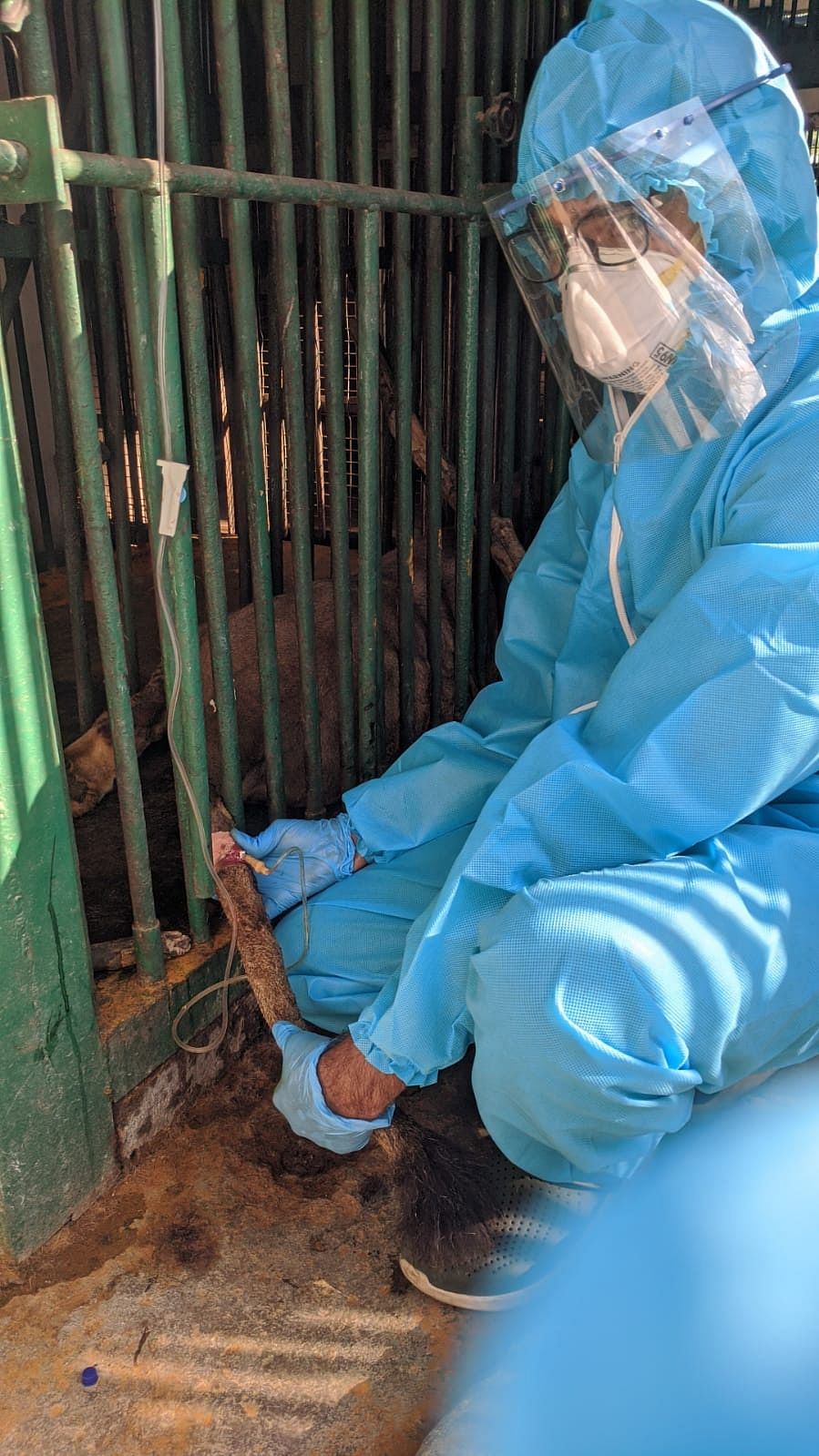Zoo in Chennai loses two lions to Covid-19 but nurses 13 others back to health
BANGALORE – The biggest and oldest zoo in the southern Indian city of Chennai reopened last week with resounding roars from 13 lions that have just recovered from Covid-19.
For 50 days, the staff had worked round the clock to care for the sick felines, developing what forest officials believe could be a treatment protocol for other zoos and national parks around the world.
As soon as the veterinary team at the Arignar Anna Zoological Park heard two lions cough in late May, in the middle of India’s devastating second wave of the pandemic, they suspected Covid-19. To confirm it, the lions had to be tested.
“But how do you take a nasal swab from a lion?” asked Dr K. Sridhar, veterinary surgeon at the 166-year-old zoo that also has a rescue and rehabilitation centre.
As tranquillisers could compromise their immunity, the team used hydraulic “squeeze cages” to restrict the lion’s movement enough for the doctors to enter the enclosure. At other times, doctors rigged a swab to a long stick they used from outside the enclosure.
This way, the staff managed to collect blood and faecal samples, as well as nasal and rectal swabs from all 15 lions.
But even before the test results were out, a nine-year-old female named Neela collapsed on her side, unable to breathe. All she had had was a runny nose that morning.
Neela’s death within 24 hours of her first cough shocked the zoo’s doctors. From that moment, the veterinary team of six did not go home for nearly two months, staying in the staff rooms to watch the lions closely.
Nine of the samples tested positive for the coronavirus, but forest officer Naga Satish Gidijala, who was the zoo’s deputy director then, said they “assumed that all the lions were positive” and treated them accordingly.
In consultation with experts at the Tamil Nadu Veterinary and Animal Science University and counterparts in New York’s Bronx, Hyderabad and Jaipur zoos that had had coronavirus-infected felines, the Chennai staff developed a treatment protocol focused on managing the symptoms and monitoring the lions.
By early June, the lions’ coughing had intensified and they had high fever. But testing their vital signs was not easy.
“There’s no way we can measure their blood oxygen levels with a clip-on meter on their paw or tongue when they are conscious, like we do with humans. So, patient monitoring and evaluation are very important,” said Dr Sridhar.
Wearing protective equipment, the fully vaccinated staff checked the lions’ temperature with thermal imaging cameras. In person and via CCTV, they observed the lions’ food intake, respiratory rate, and energy levels.
Worryingly, nearly all lions had stopped eating their daily feed of beef and liver. Hungry and dehydrated, a 12-year-old lion named Pathmanathan died on June 16.
The team tried a diet of chicken or rabbits in vain, but later, some lions lapped up mutton soup, fortified with supplements.
“Compared to humans, treating lions is a huge challenge. They can’t be asked to wear a mask, they don’t move into the squeeze cages, don’t stand (still) for darting and chew off catheters fixed for fluid therapy. They’re aggressive and ready to charge us because of repeated injections,” Dr Sridhar added.
When the ailing lions began to hide from the doctors or roar ferociously in their face, anticipating painful nasal swabs and intravenous needles, the staff hung around the enclosure for hours to comfort them before delivering any injections.
The doctors often hid, popped up suddenly to dart the lions with medicines and ducked out again, while someone else distracted them.
After 50 days, the lions roared in sequence – a presence call that healthy big cats do a few times a day. “When I heard the roars instead of the depressing coughing, I was in a state of ecstasy the whole day,” said Dr Sridhar.
On Aug 10, the zoo announced that all the lions had tested negative for the coronavirus.
The zoo’s director, Ms Kanupriya, said the lions “probably caught the virus from an asymptomatic animal keeper”. The meat they were fed was not suspect, because 31 tigers and seven leopards that ate the same feed were healthy.
All the lions had the Delta variant of the virus, said Mr Gidijala.
Scores of families visited the zoo last week, drawn by the story of the lions which survived the disease that has paralysed the world. To the curious, Dr Sridhar’s simple reply is: “It was just hard work with a scientific approach.”
Join ST’s Telegram channel here and get the latest breaking news delivered to you.
Source: Read Full Article



